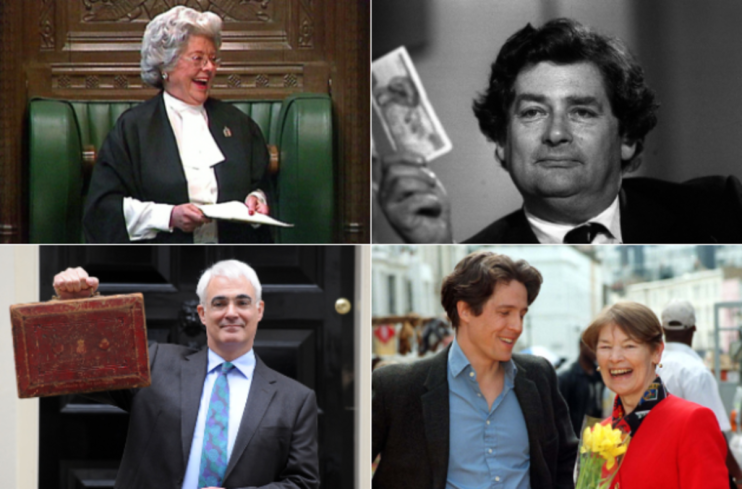Political deaths in 2023: The famous faces we said goodbye to this year

From the former Chancellor who launched the City of London with the Big Bang, to the first female Speaker of the House of Commons and an Oscar-winning actress and MP, UK politics saw the deaths of many big names over the past 12 months.
But as we end the year, it’s time to look back at the lives of those we lost from the world of Westminster throughout 2023.
Betty Boothroyd
Yorkshire-born Boothroyd, a former Tiller dancing girl, was Labour MP for West Bromwich from 1973 for almost 30 years, before becoming a crossbench Baroness in the Lords.
The first female Speaker of the House of Commons, she was described by Tony Blair as “something of a national institution” and known for her catchphrase, “time’s up” at PMQs.
She died in February, aged 93, and the friend and actress Dame Patricia Routledge, who played Hyacinth Bucket, reportedly sang at her funeral.
Alexander Cameron
Barrister and brother of former Prime Minister David Cameron, Alexander Cameron QC died in March, aged 59.
The Eton-educated barrister led the Chambers which represented Rebekah Brooks in the phone hacking trials, but did not defend her himself.
Cameron, related by marriage to TV chef Hugh Fearnley-Whittingstall, also made history as the first lawyer filmed in action at the Court of Appeal after a ban on TV cameras was lifted.
Nigel Lawson
A former Financial Times journalist and Spectator editor, and father of chef Nigella, Lawson was best known as former Conservative Prime Minister Margaret Thatcher’s Chancellor.
Credited with implementing the Big Bang, which saw the London Stock Exchange (LSE) deregulated and made a private company, Lawson spearheaded the City of London’s transformation into the world’s top financial centre.
His deregulation efforts were – and are – lauded, including by those behind the so-called ‘Big Bang 2.0’ or the Edinburgh Reforms. But opponents argued they were among the factors that led to the 2008 financial crisis.
Lord Lawson, who went on to argue against climate change and for Britain leaving the EU, was called an “inspiration” by Prime Minister Rishi Sunak upon his death, aged 91, in April.
Sunak’s predecessors Boris Johnson and Liz Truss called him the “fearless and original flame of free market Conservatism” and a “true giant of 20th-century politics”.
Glenda Jackson
Award-winning actress – including two Oscars – and Labour MP for 23 years, Glenda Jackson was another of the famous faces to die this year, in June, aged 87.
She acted alongside Morecambe and Wise, Sir Jonathan Pryce, Dame Vanessa Redgrave, and Sir Michael Caine.
In later years, she was a junior transport minister in Tony Blair’s government from 1997, after her election to Hampstead and Kilburn in 1992, and mother to Mail columnist Dan Hodges.
Margaret McDonagh
Labour’s first female general secretary, Baroness McDonagh was seen as crucial to Blair’s 1997 New Labour election victory.
She deputised for Peter Mandelson and, after being appointed general secretary in 1998, oversaw the reelection campaign in 2001 and entered the House of Lords in 2004.
McDonagh, sister to Sioban, Labour MP for Mitcham and Morden, went on a business career, including at Express Newspapers, and founded The Pipeline, to elevate female talent, before her glioblastoma – brain cancer – diagnosis in 2021. She died in June, aged 61.
Bob Kerslake
Former civil service chief Lord Kerslake died in July, aged 68, after being diagnosed with cancer.
He previously worked at the Greater London Council, Sheffield City Council and was the permanent secretary at the Department for Communities and Local Government from 2010 to 2015, and went on to lead the civil service from 2012 to 2014, under the coalition.
Lord Kerslake, who became a crossbench peer in 2015, was then the chairman of King’s College Hospital and led the investigation into the 2017 Manchester Arena bombing.
He was working with Labour on preparations to enter government and, on his death, Sir Keir Starmer praised him as a “talented public servant, utmost professional, and a good man”.
Alistair Darling
Former Labour chancellor and ex-Edinburgh MP, Alistair Darling, who was at the helm of the Treasury during the 2008 financial crisis, also died in November, aged 70.
Darling served in cabinet for 13 years, under Blair and Gordon Brown, but began professional life as a lawyer before going into politics in 1982.
As a minister, he worked on reforming financial regulation, delivering Labour’s welfare reforms and said he hoped to “eradicate poverty”.
After a crucial stint at the Treasury, he led the Better Together campaign during the Scottish independence referendum in 2014 and was a key Remain voice on the Stronger In campaign during the Brexit referendum of 2016.
He retired from the House of Lords in 2020, and upon his death was praised as a “devoted public servant” by Starmer, and “one of the great chancellors” by Jeremy Hunt.
Glenys Kinnock
Ex-foreign minister and MEP Glenys Kinnock – also wife to former Labour leader Neil Kinnock – died in December aged 79.
Kinnock entered the European Parliament in 1994 and went on to become Baroness Kinnock of Holyhead, sitting in the Lords from 2009 to 2021.
She campaigned around nuclear missiles, miners’ strikes, poverty and hunger in Africa and the global south, and was Labour’s minister for Europe under Gordon Brown.
The political couple’s son, Stephen, is now Labour MP for Aberavon.
